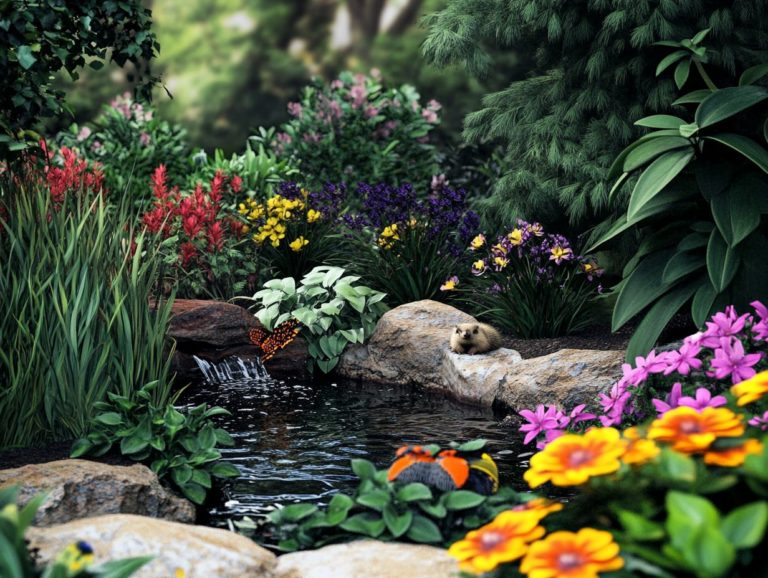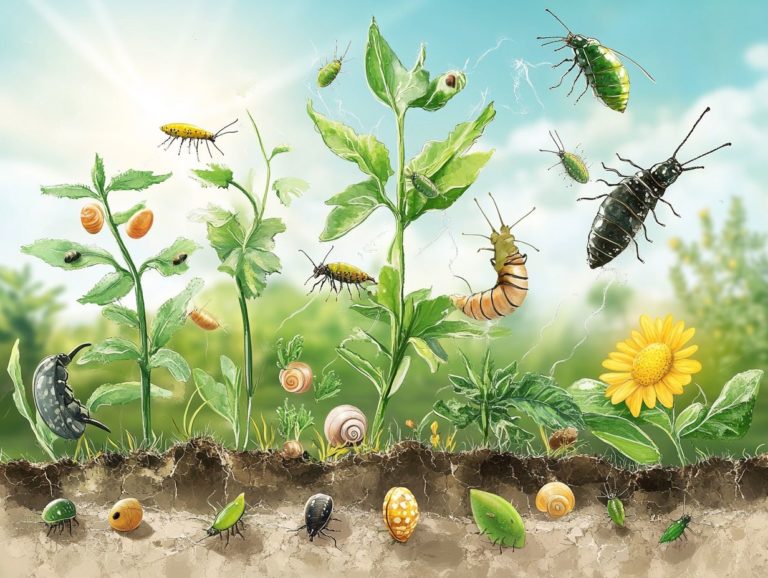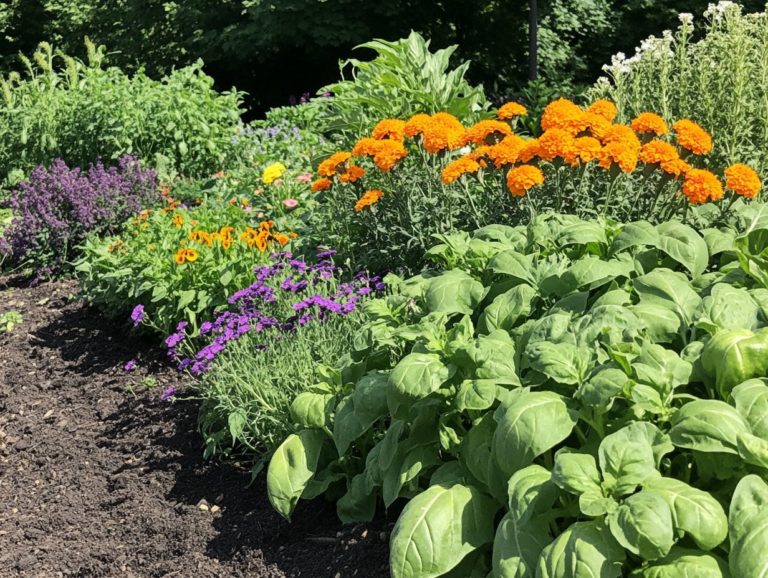5 Plants That Repel Common Garden Pests
Gardening is undeniably a rewarding pursuit. However, the battle against pesky pests can often test your patience.
Fortunately, certain plants can create a natural barrier against those unwelcome intruders in your garden.
Consider five outstanding options: Marigolds, Lavender, Basil, Chrysanthemums, and Rosemary. Not only do these plants add a touch of beauty to your space, but they also serve to repel common pests.
In this exploration, you ll learn how these plants work, discover their additional benefits, and gather essential gardening tips for their care.
Uncover how you can elevate your garden’s health while keeping it blissfully pest-free!
Contents
Key Takeaways:
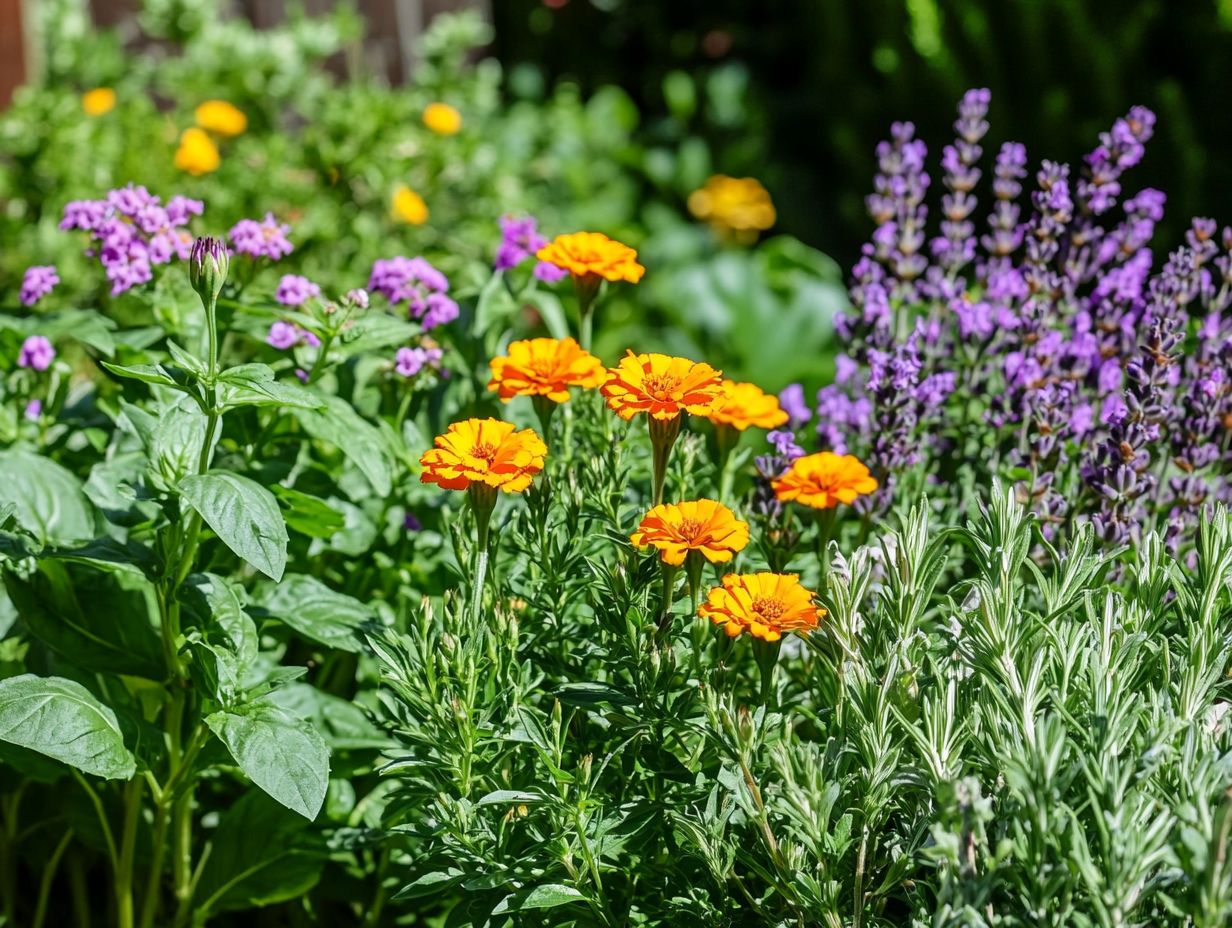
- Marigolds, lavender, basil, chrysanthemums, and rosemary effectively repel pests while adding beauty to your garden.
- These plants use strong scents and natural oils to keep unwanted bugs away, making them a fantastic alternative to chemical pesticides.
- In addition to repelling pests, these plants attract pollinators and add a pop of color to the garden.
1. Marigolds
Marigolds are celebrated for their vibrant blooms. They are also valued for their remarkable ability to repel harmful insects.
This makes marigolds a must-have in your garden for effective pest control. With their natural pest deterrent properties, marigolds can keep pesky invaders at bay while enhancing your garden’s visual appeal with their stunning flowers.
These hardy plants, especially the French and African varieties, emit distinctive scents that many pests find uninviting. By strategically planting marigolds among your vegetables and herbs, you can create a natural barrier against aphids, nematodes, and whiteflies.
The bright colors and inviting nectar of marigolds attract beneficial insects like ladybugs and lacewings, contributing to a thriving ecosystem in your garden.
To seamlessly integrate marigolds into your gardening methods, consider companion planting or growing them in containers or raised beds. Ensure they receive plenty of sunlight and well-draining soil to thrive, and you’ll enjoy a healthier, more vibrant garden.
2. Lavender
Lavender is more than just a stunning aromatic herb; it s also one of the most effective allies in your garden against common pests. Its potent essential oils serve as a natural insect repellent, making it an essential addition to any thriving garden.
This versatile herb offers a delightful fragrance that elevates the sensory experience of your outdoor spaces. It also acts as a strong deterrent against mosquitoes and other pesky insects.
With varieties such as English, French, and Spanish lavender each boasting unique characteristics you can select the perfect plant that flourishes in your specific climate and soil conditions.
Caring for lavender is a breeze, requiring little more than well-drained soil and ample sunlight. This makes it an excellent choice for everyone, from novice gardeners to seasoned green thumbs.
Companion planting with lavender boosts pollinator activity, inviting bees and butterflies into your garden and enriching overall biodiversity.
3. Basil
Basil, a cherished culinary herb, serves as a remarkable ally in your garden. Not only does it elevate the flavors of your dishes, but it also possesses an impressive knack for repelling insects.
Its potent aromatic oils act as a strong deterrent against pesky invaders like aphids, mosquitoes, and whiteflies. At the same time, basil attracts beneficial insects, such as pollinators and predatory wasps, which help keep harmful bug populations in check.
When you practice companion planting, basil thrives alongside crops like tomatoes, peppers, and lettuce. This enhances their growth and flavor while effectively warding off detrimental insects.
To ensure optimal growth, basil flourishes in warm, well-drained soil that enjoys abundant sunlight, creating an ideal environment for both the herb and its neighboring vegetables. This harmonious planting approach not only boosts your harvests but also nurtures a healthier ecosystem in your garden.
4. Chrysanthemums

Chrysanthemums come in a stunning variety of colors. They not only beautify your garden but also keep pesky insects away.
The key natural chemicals in these vibrant flowers, particularly pyrethrins and linalool, are effective at disrupting the nervous systems of annoying bugs like aphids and spider mites.
By weaving chrysanthemums into your garden, you elevate its charm while creating a natural barrier against these unwanted guests.
Plant them alongside more delicate species or incorporate them into borders and flower beds. This eco-friendly solution reduces the need for synthetic pesticides and nurtures a healthier ecosystem.
5. Rosemary
Rosemary is a standout herb that enhances the flavor of your meals. It s also recommended by gardening experts for its remarkable pest deterrent properties.
The aromatic oils it releases create a scent that many harmful insects find repelling. This establishes a protective barrier for surrounding plants.
This impressive ability to keep away pests like mosquitoes and cabbage moths makes rosemary an invaluable ally in any garden.
Ready to grow this amazing herb? Ensure you plant rosemary in well-drained soil under full sunlight for vibrant growth.
Regular pruning maintains its shape and encourages denser foliage, boosting its pest-repelling ability. Positioning rosemary near vulnerable plants can significantly improve your garden’s health.
This also infuses the space with a delightful aroma that benefits both the plants and you as a gardener.
How Do These Plants Repel Pests?
To understand how these plants keep bugs away, let s look at what makes them special. Their distinct characteristics and the natural repellents they produce work together to keep harmful insects at bay.
These plants often exude essential oils and aromatic scents that pests find unappealing while attracting beneficial insects. This creates a natural barrier against unwanted visitors.
The chemical compounds they release can disrupt the reproductive systems of certain pests or hinder their feeding abilities, adding another layer of protection for your plants.
By incorporating these natural pest-repelling plants into your garden, you cultivate a sanctuary that deters unwelcome guests while nurturing pollinators and other beneficial organisms.
This thoughtful integration contributes to a thriving environment, making your gardening experience truly enjoyable!
What Are the Most Common Pests These Plants Repel?
Among the numerous garden pests that threaten your plants, certain common culprits like aphids, whiteflies, and spider mites can be effectively kept away with the strategic use of plants such as marigolds, lavender, and basil, as highlighted by gardening experts in their guide on the best companion plants for pest control.
Add these aromatic and vibrant plants to your garden design to create a natural pest deterrent that fosters ecological balance.
Marigolds, with their striking blooms, release a scent that confuses and repels aphids and nematodes, making them great companions for your vegetables.
Lavender not only enhances your garden’s beauty but also emits a strong fragrance that deters whiteflies, reducing their population.
Meanwhile, basil’s natural oils possess insect-repelling properties that help fend off spider mites and other troublesome bugs, contributing to a diverse ecosystem that attracts beneficial insects while keeping harmful pests away.
How Can These Plants Be Used in the Garden?
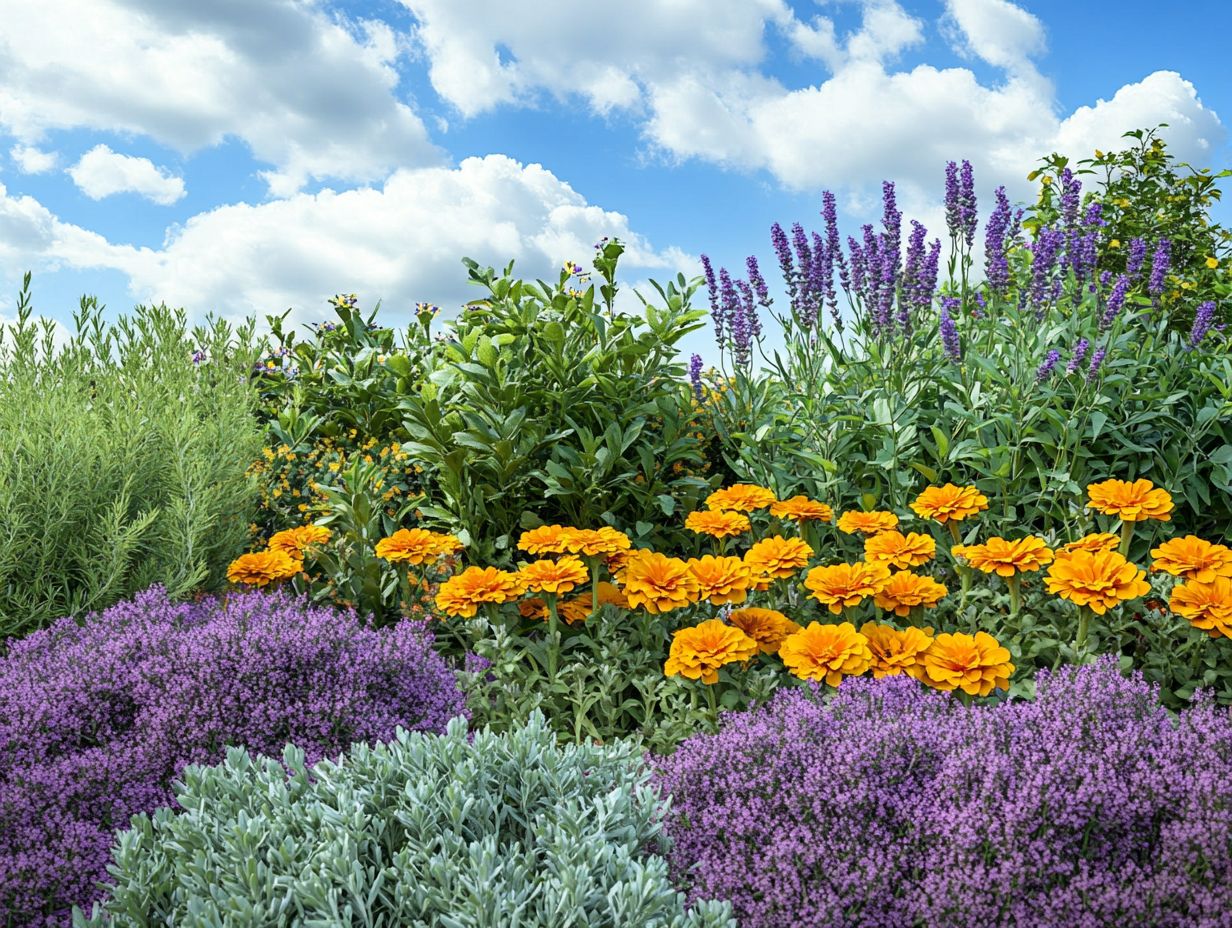
Incorporating plants that repel insects into your garden can significantly elevate your gardening game. They provide natural pest management solutions through techniques like planting different types of plants together for better growth. This approach enriches the soil and enhances the overall health of your plants.
By strategically placing repellent plants such as marigolds, basil, or lavender alongside your more vulnerable crops, you create a nurturing and protective environment. For example, marigolds emit a scent that repels nematodes, making them an excellent companion for your tomatoes. Interplanting aromatic herbs like rosemary near cabbage can confuse aphids, greatly reducing their chances of causing an infestation.
Arranging taller plants to form natural barriers helps shield your smaller crops from wind and pests. By thoughtfully mapping out your garden layout, you maximize these benefits. This bolsters your pest control efforts while fostering biodiversity within your garden ecosystem.
Are There Any Other Benefits to Planting These Repellent Plants?
Beyond their main function of keeping pests at bay, planting aromatic herbs and repellent plants offers many benefits that boost your garden s health and vibrancy.
These plants attract a variety of pollinators, such as bees and butterflies, which play a crucial role in fertilizing many of your favorite fruits and vegetables. By incorporating herbs like basil and dill, you elevate your culinary creations and enrich the soil with organic matter as they break down. This supercharges your soil structure and improves how well plants get nutrients, contributing to healthier crops.
When you create a diverse planting scheme, you cultivate resilience against diseases and pests. This results in a thriving gardening environment that satisfies both nature and your household.
What Are the Best Ways to Care for These Plants in the Garden?
Caring for pest-repelling plants requires understanding their specific preferences, such as sunlight exposure, watering requirements, and soil conditions. These factors are crucial for cultivating a garden that effectively manages pest populations.
By consistently attending to these elements, you create an optimal environment that promotes growth and enhances the natural benefits these plants provide. For instance, ensuring proper drainage and using organic fertilizers improves soil health, while regular pruning fosters better air circulation.
Keep a vigilant eye out for signs of pests or diseases early on to significantly reduce potential issues. Incorporating crop rotation and companion planting strategies amplifies the defensive qualities of these plants, ensuring they not only survive but flourish in your garden.
Are There Any Plants That Should Not Be Planted Near These Repellent Plants?
While incorporating pest-repelling plants boosts your garden’s health, it s essential to consider each plant’s preferences. You should steer clear of invasive species or harmful plants that might undermine their effectiveness.
Take marigolds, for example. They excel at repelling nematodes and aphids, but planting them near mint risks competition for nutrients and water, which could weaken their pest-repelling abilities. Experts also caution against placing garlic near beans; the strong aroma of garlic may disrupt the growth of the beans.
As a gardener, it s wise to choose companions for your repelling plants thoughtfully. Certain combinations can enhance or detract from pest control. Tapping into local gardening resources can provide valuable insights into beneficial and detrimental pairings, helping you cultivate a thriving garden ecosystem.
Frequently Asked Questions
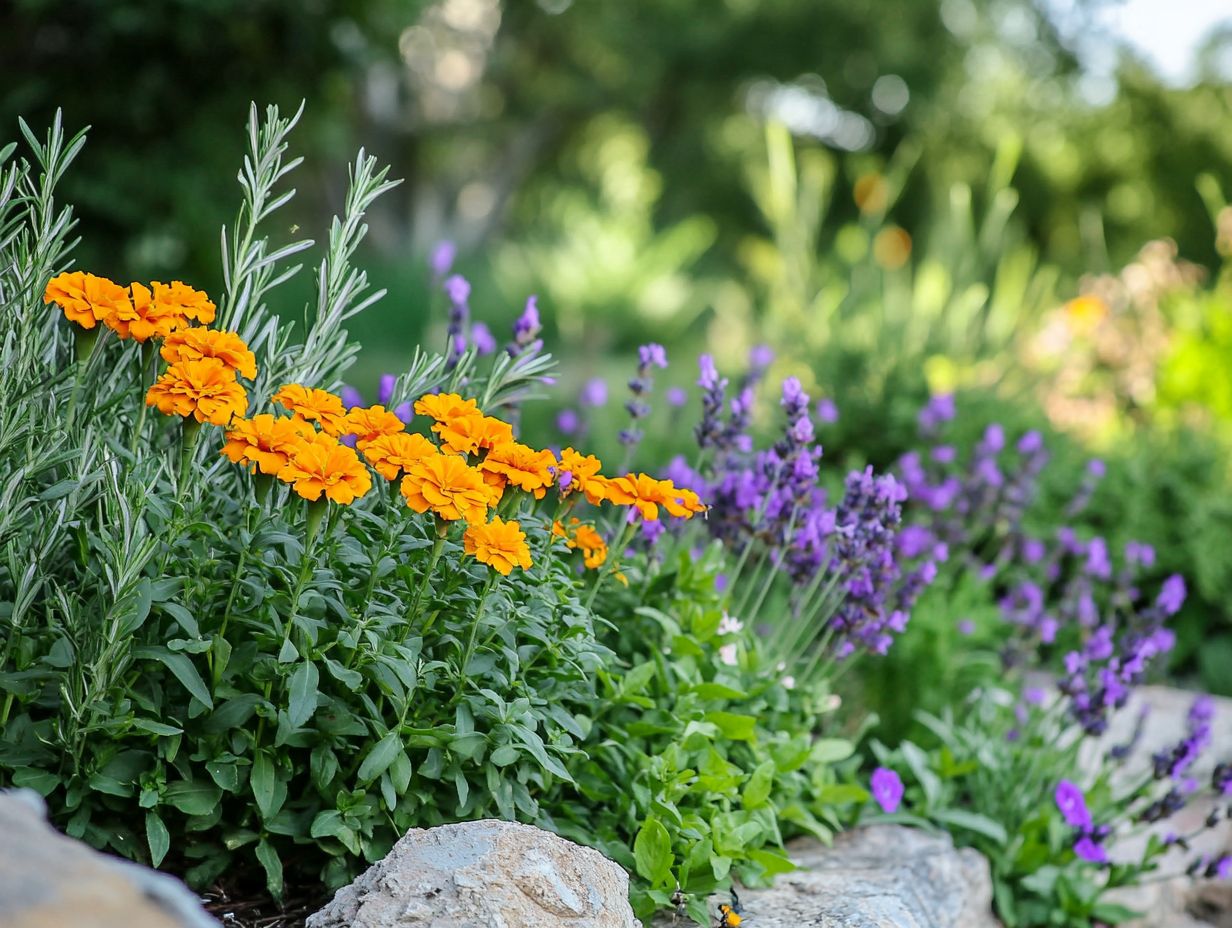
What are the top 5 plants that repel common garden pests?
The top 5 plants that repel common garden pests are: marigolds (bright flowers that keep pests away), lavender (fragrant flowers that deter insects), basil (aromatic herb that repels flies), rosemary (herb that wards off various pests), and mint (strongly scented herb that keeps pests at bay).
How do marigolds repel pests in the garden?
Marigolds have a strong scent that keeps pests like aphids and whiteflies away. They also release a chemical that harms many harmful insects.
Why is lavender a good plant for pest control?
Lavender contains linalool, a natural compound that repels mosquitoes and fleas. Plus, it attracts helpful pollinators like bees and butterflies, keeping your garden thriving.
Can planting basil in my garden help keep pests away?
Yes! Basil is a tasty herb that can also drive away flies and mosquitoes. Plant it near tomatoes to protect them from common pests.
How does rosemary protect my garden from pests?
Rosemary s strong scent deters pests like cabbage moths and carrot flies. It also attracts beneficial insects that help control these pests effectively.
Is mint effective in repelling garden pests?
Absolutely! Mint’s refreshing scent is a turn-off for many insects like ants and aphids. It’s best to grow mint in containers to keep it from spreading uncontrollably.

